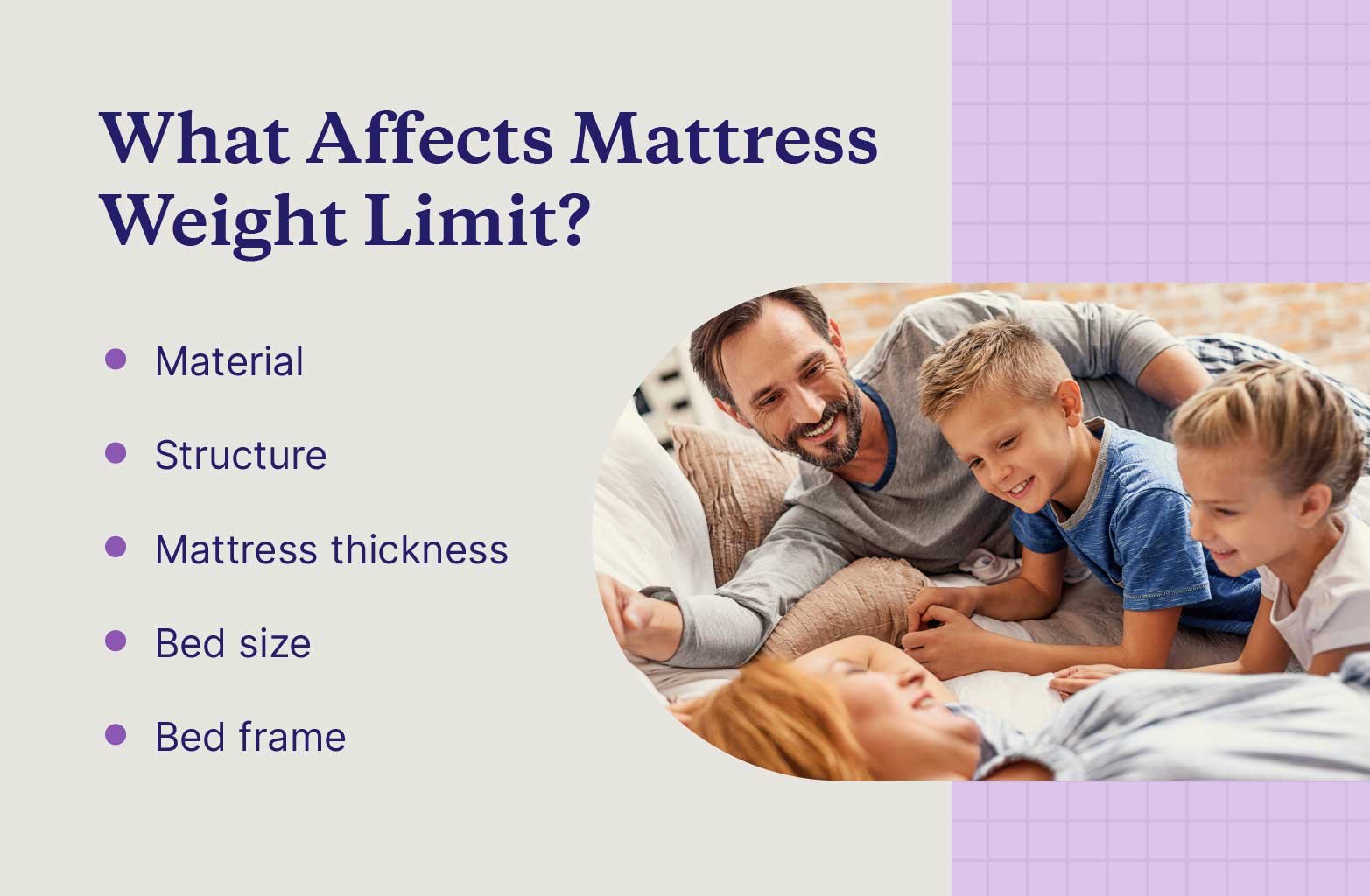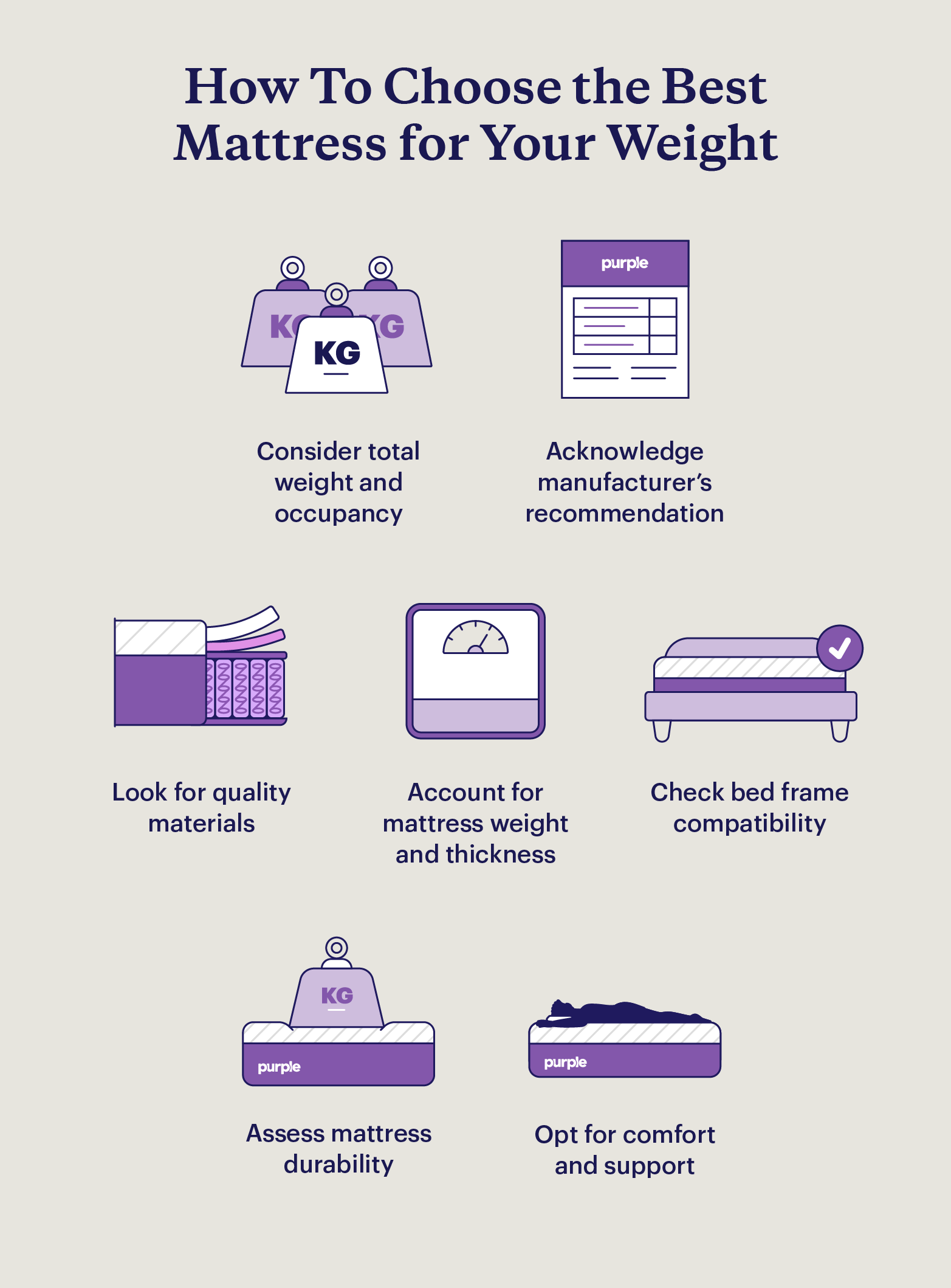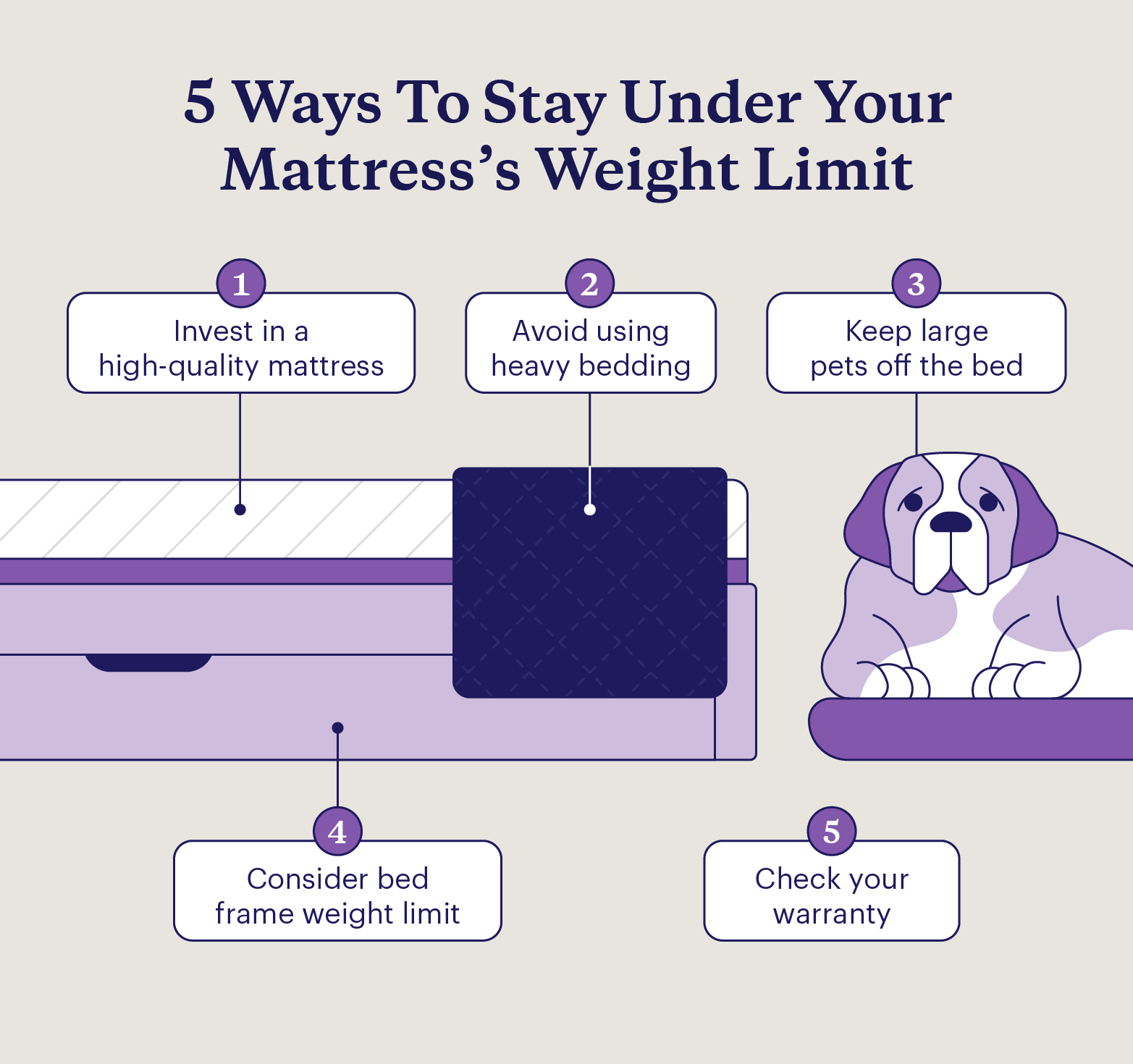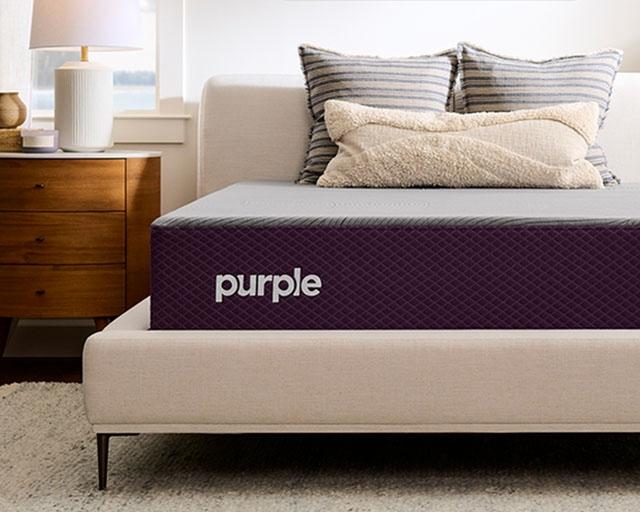
Mattress Weight Limit: Why It Matters [Comprehensive Guide]
Key Takeaways
- Mattress weight limits cover the recommended total weight for sleepers, bedding, pets, and accessories to prevent premature deterioration and your discomfort.
- Standard queen and king size beds support at least 500 pounds and most twin and full size beds support at least 250 pounds.
- Purple mattresses are tested to support 700 pounds of total weight.
Mattress weight limits are suggested thresholds for how much weight or pressure a mattress can hold. Most mattresses can support plenty of weight, but the more pressure you regularly put on the mattress, the faster it may wear out.
Understanding mattress weight limits can help you choose a mattress that provides the support you need and won’t break down more quickly than it should.
Purple mattresses are tested to support 700 pounds of combined weight — including body weight, blankets, and pets — and relieve pressure points with our adaptive GelFlex® Grid and Comfort Foam.
Weight limits can be an indicator of mattress quality and durability, but your preferences for comfort and support take priority. It’s important to learn what bed weight limits are to ensure your safety and satisfaction.
Bed Size | Average Weight Limit |
| Twin | 250 pounds |
| Full | 250 pounds |
| Queen | 500 pounds |
| King | 500 pounds |
Bed capacity varies based on factors such as material and construction, so you should check the product description and warranty for specific mattress weight limits. Purple mattresses are tested to support over 700 pounds, and our hybrid models may be more comfortable and supportive for heavier individuals.
How Much Weight Can a Bed Hold?
Most single beds are designed to support at least 250 pounds at a time, and larger sizes can typically support 500 pounds. Mattresses from Purple support at least 700 pounds, making them suitable for a wide range of body types.
Bed weight capacity varies based on factors such as:
- Material: Low-density memory foam mattresses may have a lower bed weight limit than latex, innerspring, or hybrid mattresses.
- Mattress structure: Mattresses with multiple layers and coils may support more weight because they have a stronger internal structure.
- Mattress thickness: Thickness is not necessarily an indicator of a higher weight limit, but hybrid and innerspring mattresses tend to be thicker and more supportive.
- Size: Beds designed for single sleepers — usually twin and full sizes — will often support less weight compared to the bed weight capacity of a queen or king.
- Bed frame or foundation: Foundation, box spring, and bed frame weight limit varies as well, so make sure you choose a base that can support the combined weight of you and your mattress to avoid damage and discomfort.
While mattress weight limits aren’t strict rules you have to follow, these recommendations are in your best interest. Exceeding weight limits can damage your mattress, weaken your bed frame, and disrupt your sleep.
Why Bed Weight Limits Exist
Mattress manufacturers often establish weight limits to ensure mattress durability and longevity. With normal use, mattresses may last up to 10 years, but exceeding the recommended weight limit can mean putting additional pressure on the mattress, wearing it down more quickly.
Over time, putting more than the recommended amount of weight on your mattress may result in:
- Premature sagging or warping
- Damage to structural springs or coils
- Damage to bed frame or foundation
- Degradation of support and pressure relief features
- Discomfort, pain, and poor sleep quality due to mattress damage
For some companies, exceeding the weight limit on a mattress could void your warranty. But this isn’t the case for Purple mattresses. Our weight limit is a recommendation to ensure you can sleep comfortably for as long as possible.
Considerations for Choosing the Best Mattress for Your Weight
When you choose a new mattress, you should look for one that provides the support you need and keeps you comfortable without wearing out too quickly. Before buying a mattress, consider the following factors to get the most support for your body.
1. Total Weight and Occupancy
Take into account the total weight that will rest on your mattress, including:
- You
- Your partner
- Kids
- Pets
- Bedding
The number of sleepers and each individual’s body weight can affect weight distribution, so if you’re co-sleeping with a partner, it’s important to choose a mattress designed to support more than one person.
2. Manufacturer’s Recommendation
Depending on the brand, you may have to search for the recommended weight limit, but each manufacturer should have this information on their website. Check product descriptions, support pages, and warranties to find what manufacturers recommend as the maximum weight for their mattresses.
In most cases, the weight limit on a mattress is a suggestion intended to help you make an informed buying decision. But if the total weight of sleepers and accessories exceeds the recommended weight limit, you may experience premature deterioration depending on the mattress structure and materials.
3. Materials
The type, construction, and quality of materials used in your mattress affect how long it will last and how well it will support your body. The most common types of mattresses include:
- Foam: Foam mattresses primarily feature layers of polyfoam, though they may also include latex or fabric. These mattresses don’t have coils, which means their structure is often less supportive and durable, especially for heavier individuals.
- Latex: Latex mattresses are usually denser and more supportive than foam mattresses. Latex beds may be more cooling than materials like memory foam, and the material responds quickly to pressure, giving it a bouncier feel.
- Innerspring: Innerspring mattresses offer more structured support than other options but tend to be less comfortable. If you like innerspring beds, you may want to consider one with thick comfort layers to cushion your pressure points.
- Hybrid: Combining the structure of an innerspring bed with the pressure relief of foam and latex mattresses, hybrid mattresses are both comfortable and supportive. Hybrid mattresses are often durable and have good edge support, making them an option worth considering regardless of your weight.
All Purple mattresses are tested to support upwards of 700 pounds. Purple Restore™ Hybrid mattresses may offer the best combination of supportive structure and contouring comfort, but individual preferences may vary.
4. Mattress Weight and Thickness
The weight of your mattress doesn’t directly correlate with how much weight it can hold, but denser mattresses made with sturdier materials may weigh more than lower-quality options. Mattresses with comfort and support layers may be thicker and weigh more as well. Heavier mattresses are not inherently more supportive, but you may find that the most supportive mattresses are thicker and heavier than an average mattress.
Purple mattress weights range from 65 pounds (twin Purple® Mattress) to over 260 pounds (split king Purple RejuvenatePremier™). Our thicker, heavier mattresses have added comfort features like 5 Zone Edge-to-Edge Coils and dual layers of Ultra Comfort Foam, providing more structured support and cushioning comfort.
5. Bed Frame Compatibility
Unless you’re placing your mattress directly on the floor — which we advise against — you should also consider bed frame weight limits before purchasing a new mattress.
Bed frames and foundations usually have a high capacity to account for the weight of your mattress, but be sure to account for the total weight of your mattress and bedding along with body weight.
The Purple Premium Smart Base and Purple Premium Plus Smart Base can support up to 750 pounds including your mattress and anything on top of it, while the Purple Foundation and Purple Bed Frame can support up to 2,000 pounds.
Using an incompatible or insufficient foundation could be a safety hazard. Exceeding this weight limit may put too much pressure on the foundation or bed frame, which could result in structural damage.
6. Structure and Durability
No matter what you weigh, you should look for a mattress with a supportive interior structure made with high-quality materials. Some types of mattresses may break down more quickly under greater pressure. Low-density memory foam mattresses may lose their structure faster than a latex or hybrid mattress.
For heavier individuals and couples, a balance between comfort, pressure relief, and support is key. You might look for options that offer superior edge support and targeted pressure point relief. But your individual comfort preferences should take top priority when choosing a new mattress.
7. Comfort and Support
Your top priority should be what is most comfortable for you since individual preferences vary. Your mattress should support your body, promote proper spinal alignment, and provide the pressure point relief you need for your sleep style and body type. Look for edge support to make it easier for you to get out of bed as well.
You should also assess mattress firmness to find a bed that is soft enough to cushion you but firm enough to prevent you from sinking into the mattress. Heavier individuals may prefer a medium or medium-firm mattress, especially if they sleep on their stomachs, but you are the expert on what feels best for you.
How To Avoid Exceeding Your Mattress’s Weight Limit
Exceeding the weight limit of your mattress likely won’t make your bed collapse immediately. However, putting too much pressure on your mattress can make it wear out faster. That means you may have to replace your mattress more often or continue sleeping on an uncomfortable, unsupportive mattress.
Mattress weight limits are suggestions, but keeping them in mind can help you get more use out of your mattress. Avoid exceeding your mattress’s weight limit with these tips:
1. Choose a High-Quality Mattress That Meets Your Needs
Buying a new mattress can be an investment, so it’s important to pick the right one for you and your partner. Several factors can affect the durability and lifespan of your mattress, including:
- Materials
- Mattress construction
- Mattress durability
- Weight limit
If you’re sleeping with a partner, twin and full beds may not have a high enough weight capacity to comfortably support both of you for as long as a queen or king size bed could.
Consider your unique sleep needs, the total weight you’ll put on your bed, and your comfort preferences before you buy a new mattress. Doing so can help you avoid exceeding any weight limits and keep your mattress in great condition.
2. Consider Bed Frame Weight Limit
It’s not enough to be mindful of your mattress’s weight limit. Bed frames and foundations also have recommended weight capacities you should consider. Every brand and type of base is different, so verify the weight limit before you place your mattress or sleep on it.
The weight limit will vary depending on the kind of bed foundation you use, but remember that this capacity includes the weight of your mattress as well as your body weight, bedding, and pets.
The weight of a mattress can range from 50 to over 200 pounds. Your mattress may be able to support your weight, but if the total weight including your mattress exceeds the weight limit of your bed frame, you could risk damaging the base.
Make sure you take into account how much your mattress weighs and how much weight your bed frame or foundation can support. Choosing a base that supports enough weight can prevent structural damage, keeping you safe and ensuring your mattress has a sturdy foundation.
Most Purple foundations and bed frames have been tested to support up to 2,000 pounds of total weight, giving you the structure and stability necessary to keep your mattress stable and supported.
Adjustable bases, like the Purple Premium Plus Smart Base, may have lower weight limits than standard foundations to ensure optimal performance. Purple’s adjustable bases can support up to 750 pounds of total weight.
3. Avoid Heavy Bedding
Blankets and comforters may not cause premature sagging on their own, but over time, the amount of pressure you consistently put on your mattress can start to wear it out.
If you’re worried about exceeding the weight limit of your bed, avoid using heavy bedding like multiple weighted blankets at the same time. And if you do want to use heavy bedding, put it away when you wake up to help prevent damage. Be wary of keeping weighted blankets on your bed at all times, as this added weight can cause premature sagging.
4. Keep Pets Off the Bed
As nice as it can be to cuddle with your pets, they add to the total weight and pressure put on your mattress. If you want your mattress to last longer and provide the support you need, it’s best to keep larger pets, especially dogs, off your bed.
Giving your pets a bed of their own to sleep on can prevent excessive wear and tear, so you don’t have to clean your mattress as often.
5. Check Your Warranty
In some cases, exceeding the weight limit of your mattress may void the warranty, so it’s important to verify what limits your mattress has as well as what kind of damage is covered.
Exceeding the weight limit of a Purple mattress will not void your warranty. However, we advise that you consider our recommended weight limits to ensure you get the support and comfort you need.
Best Purple Mattresses for Heavier Sleepers
If you’re searching for the best mattress for heavy people, you’ll want to find one that can comfortably support your body and provide pressure relief where you need it most.
All Purple mattresses are suitable for heavier individuals. We test all of our mattresses to support 700 pounds, but they can comfortably support more. It’s also important to choose a foundation or base that can safely support the total weight of you, your partner, your bedding, and your mattress.
Medium to firm hybrid mattresses may be the most comfortable and supportive options for heavier individuals, though your preferences may vary.
Keep mattress weight limits in mind before buying a mattress to ensure you choose a bed that will meet your needs without wearing out too quickly. Ultimately, you should choose a mattress that provides the support, pressure relief, and comfort you need.
FAQ
Yes, most mattresses have weight limits. These limits are often recommendations for how much total weight you should put on a mattress. Exceeding the weight limit may make the mattress wear out more quickly and, in some cases, doing so could void the mattress warranty.
Mattress thickness may be related to weight limit, though thickness does not necessarily correlate to how much weight a mattress can support. Mattresses with multiple layers, especially hybrid mattresses, tend to be thicker than foam and innerspring mattresses. Hybrid mattresses may also provide more support and have a higher weight limit.
Most full size beds can comfortably support up to 250 pounds, which includes body weight and bedding. However, this weight limit varies based on the type of material used, the interior construction, and the quality of the mattress.
King beds can usually support at least 500 pounds, or 250 pounds per person. This limit may be higher depending on the type and brand of mattress you have.
Most queen size beds can hold 500 pounds. Purple mattresses of all sizes are tested to support 700 pounds, or 350 pounds per person.













